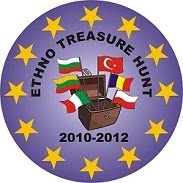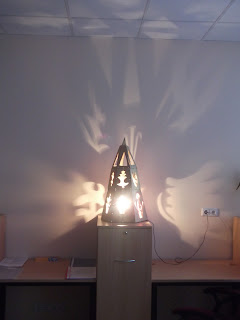Hi, all ethno-treasure hunters! I would like to tell you about our traditions and the way we celebrated our Christmas this year. People in Poland
For Poles, Christmas Eve is a time of family gathering and reconciliation. It's also a night of magic: Animals are said to talk in a human voice and people have the power to tell the future. The belief was born with our ancestors who claimed that Dec. 24 was a day to mark the beginning of a new era. We often say: "The better Christmas Eve, the merrier the whole new year." Hoping for good 12 months, everyone is polite and generous to one another and forgives the past mistakes. In the old days, "Maidens" interested in their marital future and elderly people who tried to predict next year's weather based on the sky's aura between Christmas Eve and Twelfth Night (Jan. 6), sometimes referred to past superstitions.
When we set the dinner table we always leave one plate with cutlery for an unexpected guest who may be a poor or homeless or a miserable person. The custom has it that whoever come on Christmas Eve should not be forlorn or denied. He or she will always find warmth in the house and hearts of the hosts.
Polish villagers are among the few who still keep up the old Christmas Eve customs. In eastern Poland
When going to Christmas Eve midnight mass, girls would blindfold each other and touch fence pickets. A straight and smooth picket would portend a resourceful husband, while a crooked and rough one was an indication of a clumsy and awkward spouse. If a maiden wanted to learn about her future fiance's profession, she would go to a river, dip her hand in the water and pull out the first thing she touched. Wood meant a carpenter, iron-a blacksmith, leather-a shoemaker, etc. Before going to bed, she'd wash her face with water without drying it. She would hang the towel on the footboard of her bed. The boy who passed her the towel in her dream was to become her husband.
Weather-forecasting superstitions were also popular. It was believed that if Christmas sees no snow, Easter certainly will be more severe. "If the Christmas tree sinks in water, the egg rolls on ice." Other sayings include: "A sunny Christmas Eve brings fair weather all year round", "Stars that shine bright on Christmas Eve will make hens lay plenty of eggs", "A shine on the birth of our Savior will be seen all throughout January."
From the small hours on Dec. 24, women are found cleaning and sweeping the entire house. An ancient belief has it that forces of evil would dwell in all things left dirty on that day. If the first person to enter a house on Christmas Eve was a woman, it was a bad omen, meaning that only heifers would be born in the farm in the coming year. It was a good sign when a man was the first to cross the threshold of the house.
At the Christmas Eve supper, each dish has to be sampled, and a traditional meal should consist of 12 dishes. The more you eat, the more pleasure would await you in the future. We hide some hay under the tablecloth to bring us luck. The old tradition was that the more daring diners would pull out blades of straw from underneath the table cloth. A green one foretold marriage; a withered one-waiting; a yellow one-spinsterhood; a very short one-an early grave.
In pre-electricity times, after the last supper dish (which was kutia, a mix of soaked wheat, raisins, nuts, honey and spices) candles were blown out and the direction of the smoke was observed. If it moved toward the window-the harvest would be good, toward the door-a family member would die, toward the stove-a marriage.
Until recently, harvest fortune-telling was very popular in the countryside. After supper, the host would go out to the garden, carrying dried fruit. He would throw it on the trees, shouting "Apples, pears, plums, cherries, and all the leaves in the neighbor's yard." He would take a handful of straw and twist it into a rope. Grabbing an ax with other hand, he would approach a tree and threaten it by saying, "I'll cut you down!" His wife would cry, "Don't cut it, it will bear fruit!" Then she would tie the straw rope around the tree. This bizarre little pantomime apparently brought a good harvest.
Today, few people are familiar with Christmas Eve fortune telling, especially urban dwellers. Yet some old traditions can still be found among village people who tend to lead a more old-fashioned lifestyle, closely connected to nature and its cycles of death and rebirth.
Till today, we have the custom of constructing nativity scenes of Jesus Christ and displaying them in public places for every one to admire the handicraft skills. The pictures present some of them.
*****
Like every year, we celebrated the forthcoming Christmas at school with our students and colleagues. On 22nd December, which was the last day at school before the holidays, we prepared some delicious dishes and brought small presents. The children gathered around tables in each classroom and together with their class teacher they ate, talked and wished themselves all the best. They also exchanged gifts that Santa brought to them for being good for the past year. After that, they cleaned the classrooms, bid farewell to teachers and went happily home.
Teachers also gathered around a big table to eat their Christmas Eve supper, laugh, sing carols and exchange small gifts which this year were to be a funny surprise [each present had to start with the initial letter of the name of the receiver and had to be something cute and funny]. Our headmistress, all dressed in Santa’s costume, cracked the Christmas wafer and wished all the teachers everything good for the Christmas time and New Year. Later, we tasted delicious dishes and chatted by the candle light. After that, the headmistress played Santa and distributed the presents among us. We had so much fun! Teachers turned into kids for a while laughing and joking happily. After an hour or two, we all said goodbye and with a smile on our faces we parted.
You can see some of the photos from that day below.
We didn’t forget about our partners. Our school kids and teachers prepared some Christmas presents for them. We sent: home-made postcards with Christmas wishes, some ethnic Christmas tree decorations and chocolates. We hope you enjoyed them. The pictures show the contents of the parcels.
prepared by: Joanna Wilczyńska

























